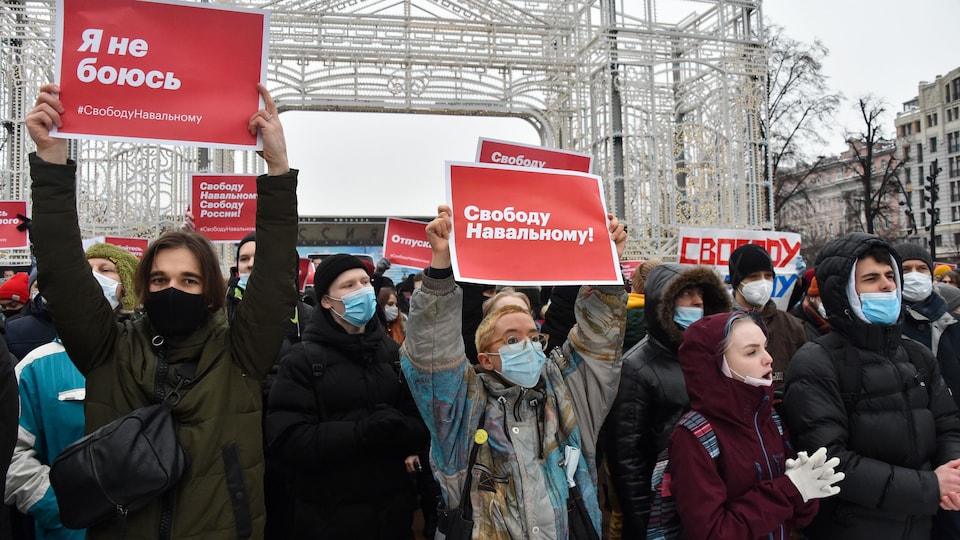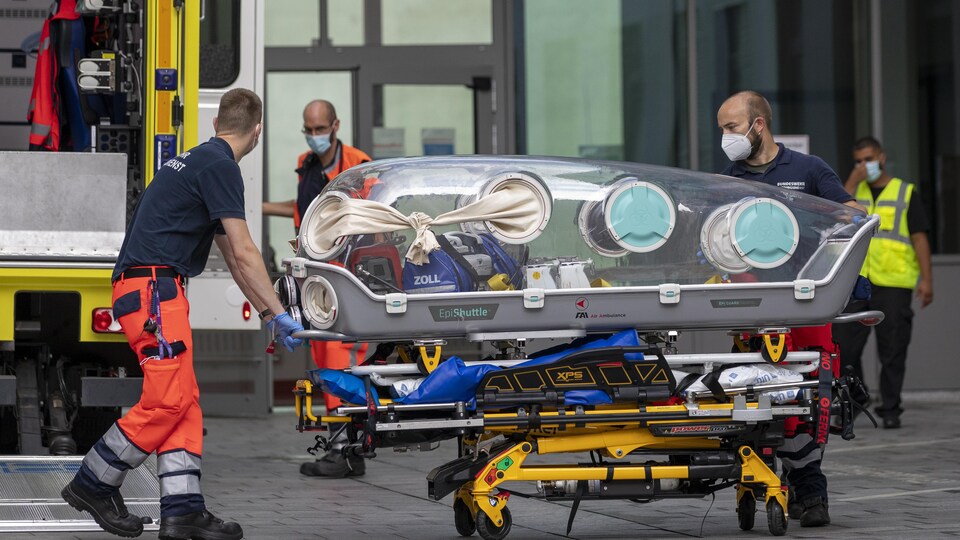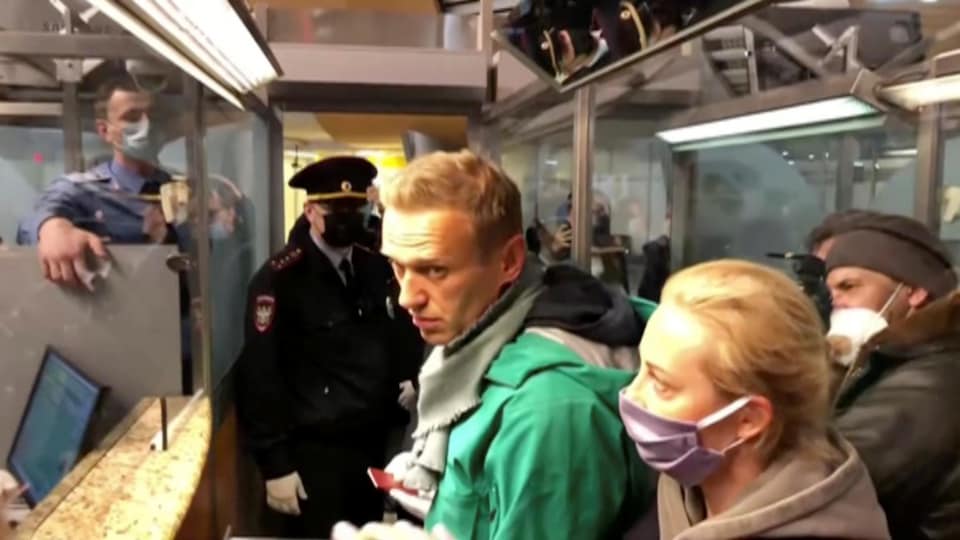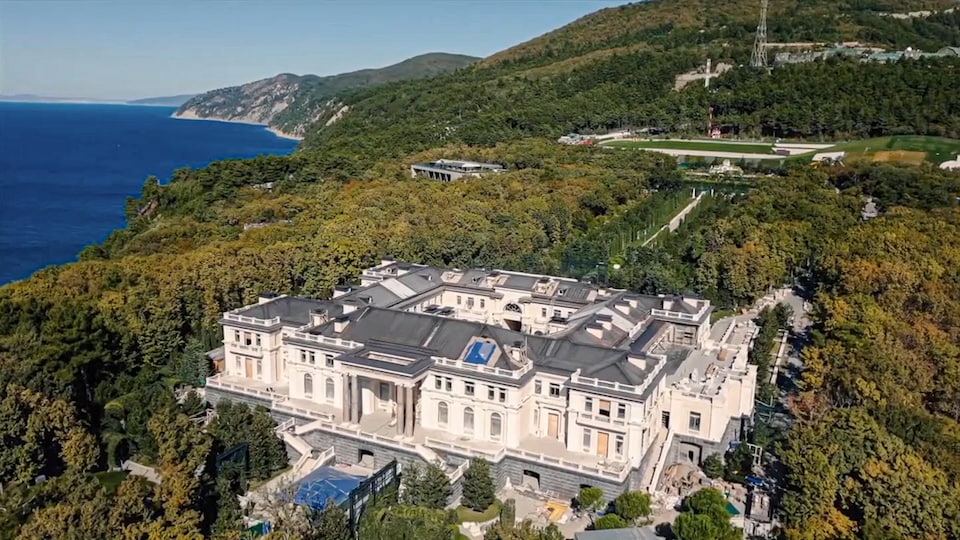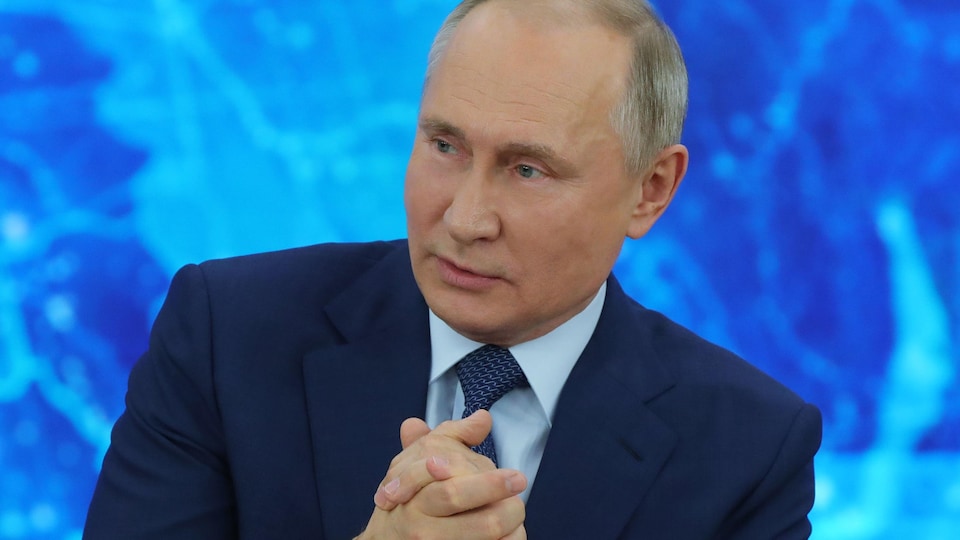A revolt signed Navalny: a new dynamic is emerging in Russia
Even before the start of the demonstration, at 2 p.m. as scheduled, an army of police surrounded the scene.
From the loudspeaker of one of the many cellular vans parked in the public square, a message sounded every 5 minutes: This gathering is prohibited
.
In other words: go home, otherwise …
Thousands and thousands of people have ignored the warnings. We have seen them come out of subways, buses and streetcars, in good spirits and determined.
Alina, 20, was there with a friend.
They are not very accustomed to such events, which are rare in Russia and are hardly ever tolerated.
If you knew how afraid I am of being beaten and arrested
, says the young woman looking around her, visibly worried.
At the same time, a troop of ten riot police pulled a young man out of the crowd by the collar. Then another, and another, and four, and ten …
Our team witnessed such arrests every 30 seconds. And it was just beginning.
It is our duty as a citizen. It is not to support Alexey Navalny as a politician, but to defend his rights and the human that he is. The problem is our regime, the repression, and that has gone on long enough.
We lost Alina in the crowd, which only got bigger and bigger, but her words resonated with just about everyone we met on Saturday.
In the end, more than 40,000 people in Moscow alone responded to the call made by Alexey Navalny, who asked the Russians to come out on the streets and not to do it for him, but for their future
.
A message that seems to have been heard not only by the already acquired supporters of Navalny, but also by citizens who until now seemed passive about the fate of Vladimir Putin’s greatest critic.
If the Kremlin expected to see crowds in major centers like Moscow, St. Petersburg and Yekaterinburg, what seems to have taken everyone by surprise is the scale of anger that has been expressed in more than 50 cities in Russia.
It must be said that the story of Alexeï Navalny is worthy of a detective story.
His poisoning in Novichok, the fact that he survived there and his return to Russia, despite the threat of being thrown in prison for years, made him a character now inescapable in Russia, and known around the world.
Like it or not, its role as an opponent has solidified.
Even state television, which for years ignored all current affairs concerning him, now talks about him, although it portrays him as a puppet of the West and a harmful influence on Russian youth.
Don’t give your child over to political pedophiles
, said star host Dmitry Kiselyov on his popular show Vesti Nedeli.
He was referring among other things to the millions of videos supporting Navalny posted by young people on the TikTok mobile app.
A phenomenon which pushed the Russian authorities to plead their cause with the leaders of TikTok, who agreed to delete certain videos on the pretext that they incite young people to demonstrate, which is illegal in Russia.
But as they say: speak well or speak badly … State television devoted almost an hour to Navalny on Sunday evening.
The Russians, who did not know him a month ago, now know that he exists and that he disturbs the Kremlin.
The Navalny machine, a well-oiled machine
Alexei Navalny’s reach goes far beyond the man he is.
The anti-corruption foundation he has set up and the team of lawyers he hires have been behind spectacular investigations into the financial abuses of power and its close guard for years.
But the most recent investigation published on YouTube a few days after his return to Russia is undoubtedly his most smoking stunt and could also explain the rage expressed in the streets on Saturday.
Entitled on Putin’s Palace, the two-hour video unveils, drone images in supportIn addition to this, you need to know more about it. (New window)In addition to this, you need to know more about it., the opulence of what Navalny claims to be Vladimir Putin’s residence on the shores of the Black Sea.
The ultra-protected 7,000-hectare property is said to have cost more than $ 1.37 billion, courtesy of the biggest bribe in history, Navalny says. A castle with a casino, a hockey rink, a spa, an amphitheater, and a secret corridor that leads to the beach.
The video has been viewed 87 million times on Youtube in less than a week and appears to have had a huge impact on public opinion, as the quality of life in general deteriorates in Russia.
Vladimir Putin is a thief
, was one of the many rallying cries heard on Saturday from demonstrators, including Galina Zolina, 69, who said she was outraged by what she saw.
We know this palace has been around for years, but Navalny has shown this to be true corruption. Who paid for this palace so that he could live like this when there are so many poor and hungry in our country?
Like so many other citizens we spoke to on the streets, Ms. Zolina fears more than ever for the safety of Alexeï Navalny, who has been in jail since returning from Germany on January 17 and could very well remain so for several years. .
The Russian authorities intend to bring him to justice on a series of criminal charges which, according to his team of lawyers, have been fabricated. He is, among other things, accused of having embezzled funds from his own foundation, which could cost him ten years in a federal penitentiary.
In a message published on Saturday, Alexeï Navalny also wanted to tell the Russians that he was fine, in case something serious should happen to him in prison. He also lets it be known that he has no thoughts of suicide and that he is in good health.
I use the stairs very carefully [et] they take my pressure everyday so sudden heart attack is ruled out
, writes the opponent in the letter he sends from prison.
Navalny is not only convinced that his poisoning was ordered and orchestrated by the Russian authorities, but an investigation carried out by the Bellingcat group supports, document and recording in support, that a group of FSB spies had followed him for years. in all his travels, including the day he was poisoned, on August 20.
These investigations have been deeply humiliating for intelligence services, says analyst Tatiana Stanovaya of the Carnegie Center in Moscow, and there is certainly a desire for revenge within the security service that she says insists on ‘he stays in prison as long as possible.
A threat to the stability of Vladimir Putin?
It would be an exaggeration to say that Alexey Navalny has become an imminent danger or a threat to Vladimir Putin’s regime, but he has most certainly solidified his role as a figure of the opposition in a country where Vladimir Putin has always managed to not to have a real one.
But the dynamics are changing and more large gatherings are scheduled for next Sunday across Russia.
But beware, you have to look at the long term
, says political scientist Catherine Schuman, reached by phone in Moscow.
What we are seeing right now are only foreplay. The real test will be the parliamentary election next fall and the degree to which Navalny and his machine can influence the vote and, consequently, the composition of the new parliament. It will be a key element.
But until then?
If the opposition movement maintains its momentum without losing momentum, there are only two possible scenarios, says Tatiana Stanovaya. Either power becomes more and more repressive, or it loses its temper and faces unpredictable political consequences
, she emphasizes.
An analysis by Tamara Alteresco, Moscow correspondent for Radio-Canada

